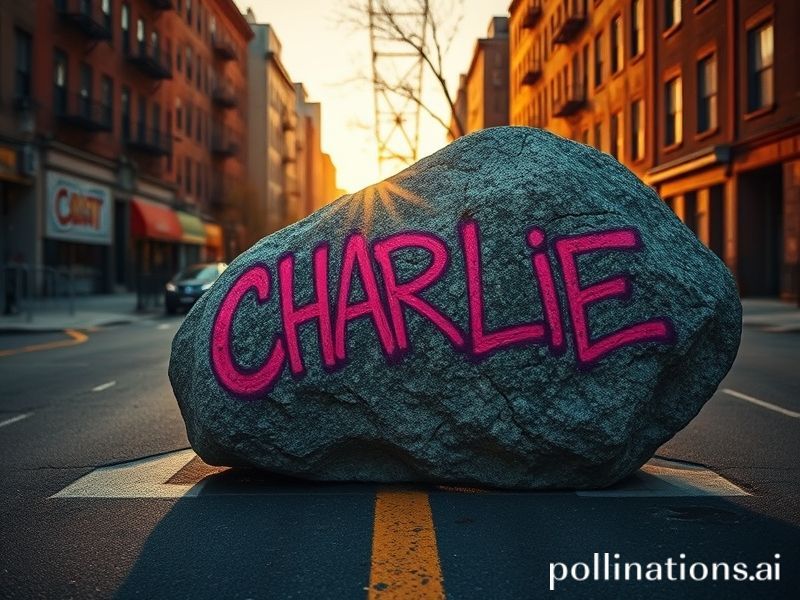Charlie Rock: How One Pebble Became the Planet’s Most Overqualified Geopolitical Football
Charlie Rock: The Pebble That Launched a Thousand Sanctions
Dave’s Locker — International Desk
The name sounds like a washed-up 1950s crooner or an indie band that breaks up after the bassist’s visa gets denied, but “Charlie Rock” is neither. Instead, it is the affectionate shorthand for a fist-sized lump of granite now sitting in a climate-controlled vault beneath The Hague, a pebble with more diplomatic frequent-flyer miles than most heads of state. How a rock—geologically indistinguishable from the gravel in your driveway—became the Rosetta Stone of global hypocrisy is a story worth a stiff drink and a bitter laugh.
The saga begins in the South China Sea, where a Chinese dredger scraped it off Mischief Reef in 2019 while “reclaiming” territory the way teenagers “reclaim” their parents’ liquor cabinet. Beijing’s cartographers calmly labeled the speck “Chiwei Jiao,” but Filipino fishermen, who’d used it to prop up crab pots for decades, called it “Charlie” after an American radar operator who once shared cigarettes and war stories. The rock was then allegedly presented as a “friendship gift” to a visiting Russian energy delegation, slipped inside a lacquered box like a petrified fortune cookie. From there, it embarked on a black-market grand tour: a Moscow oligarch’s dacha, a Qatari prince’s yacht, a shelf in a Geneva free-port between two stolen Picassos and a pallet of unmarked lithium batteries. Each stop added another layer of paperwork, forged provenance, and at least one shell company registered in Delaware, because nothing says “international intrigue” like a mailbox in Wilmington.
Why the fuss? Because Charlie Rock is the first geological specimen confirmed to contain exceptionally high concentrations of niobium and tantalum—metals vital for every smartphone, fighter-jet radar, and wind turbine from Tromsø to Tierra del Fuego. In plain English, it is the petrified goose that lays golden microchips. The UN Security Council now spends more time arguing over custody of this pebble than over actual cease-fires, proving once again that humanity will embargo baby formula before it interrupts the global supply of vibrating phone motors.
At the recent G-20 summit in New Delhi, Charlie Rock was the uninvited plus-one. Delegates discovered it had been smuggled into the venue inside a hollowed-out copy of “The Art of the Deal” left in the gift shop. The resulting diplomatic slap-fight—described by one aide as “a kindergarten sandpit but with nuclear codes”—ended with the rock being placed under joint interim custody of Singapore, a city-state whose greatest natural resource is immaculate paperwork. The Hague promptly issued an arrest warrant for the rock itself, a legal first that had scholars of international law updating their syllabi and their antidepressant prescriptions in equal measure.
Meanwhile, the private sector has sprinted ahead. Tesla quietly registered “Project Pebbles” in Nevada; Glencore floated a rumored $4.7 billion bid; and a consortium of Nordic pension funds launched an ESG-compliant ETF called “ROCK Solid Futures,” whose prospectus promises both carbon neutrality and a tasteful 8% annual return, pending nobody asks where the actual rock is. On TikTok, #FreeCharlieRock has racked up 1.3 billion views, split evenly between earnest environmentalists, crypto-bros selling fractional NFT shards of the stone, and conspiracy theorists convinced the rock is a hollow alien egg. Everyone, it seems, wants a piece—even if the piece is imaginary.
The broader significance? Charlie Rock is the perfect metaphor for our era: a tiny, inanimate object that exposes how the entire planet runs on minerals we can’t pronounce, shipped through jurisdictions we can’t spell, to manufacture devices that convince us we’re more connected than ever while we argue over who owns the gravel. It lays bare the absurdity of borders drawn by dead empires, the sanctity of supply chains built on child labor, and the solemn rituals of diplomacy that somehow treat a stone with more gravitas than actual graves.
In the end, the rock doesn’t care who drafts the next communique. Erosion will get us all eventually; Charlie will merely get there first, grain by grain, ground into the silicon of a future smartphone that will be obsolete before the box is opened. Until then, keep an eye on The Hague’s webcam—currently showing a lonely pedestal under fluorescent light—while the world’s leaders argue over custody of a pebble, blissfully unaware that the joke, as always, is on us.







